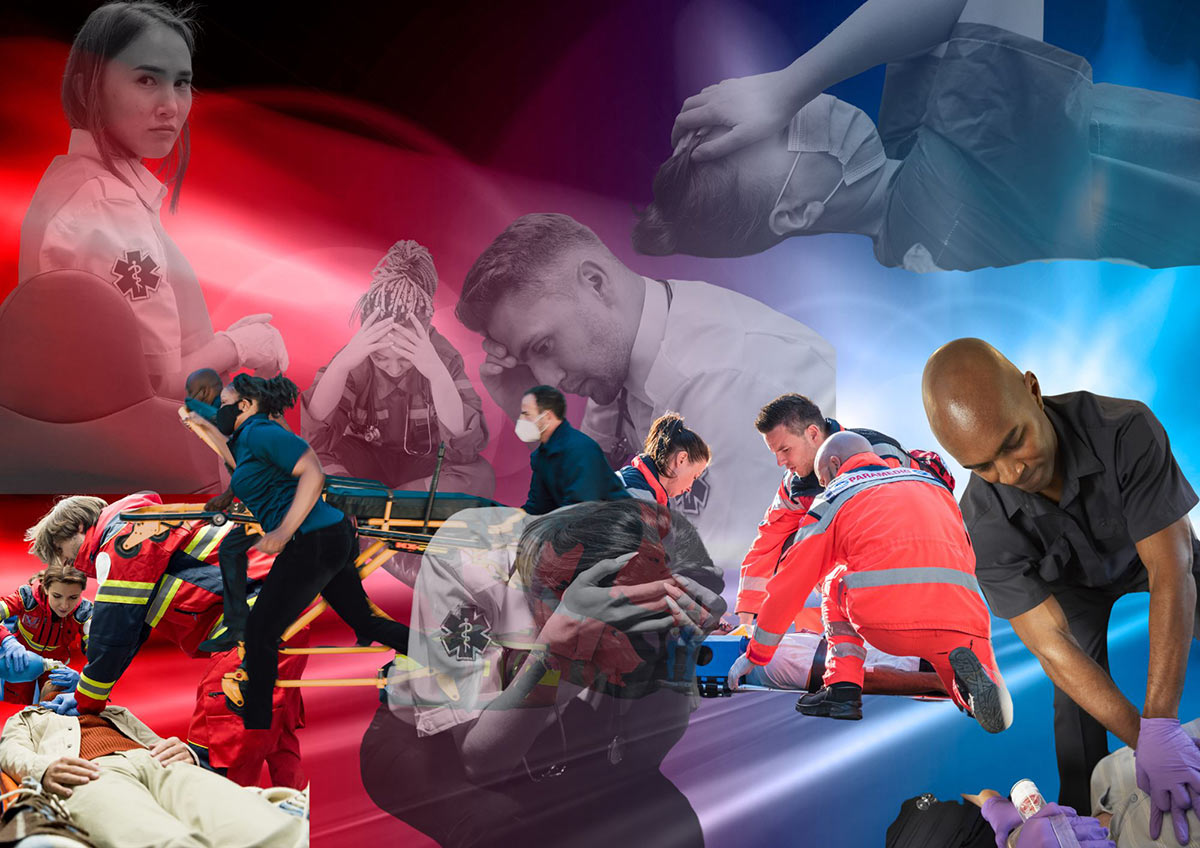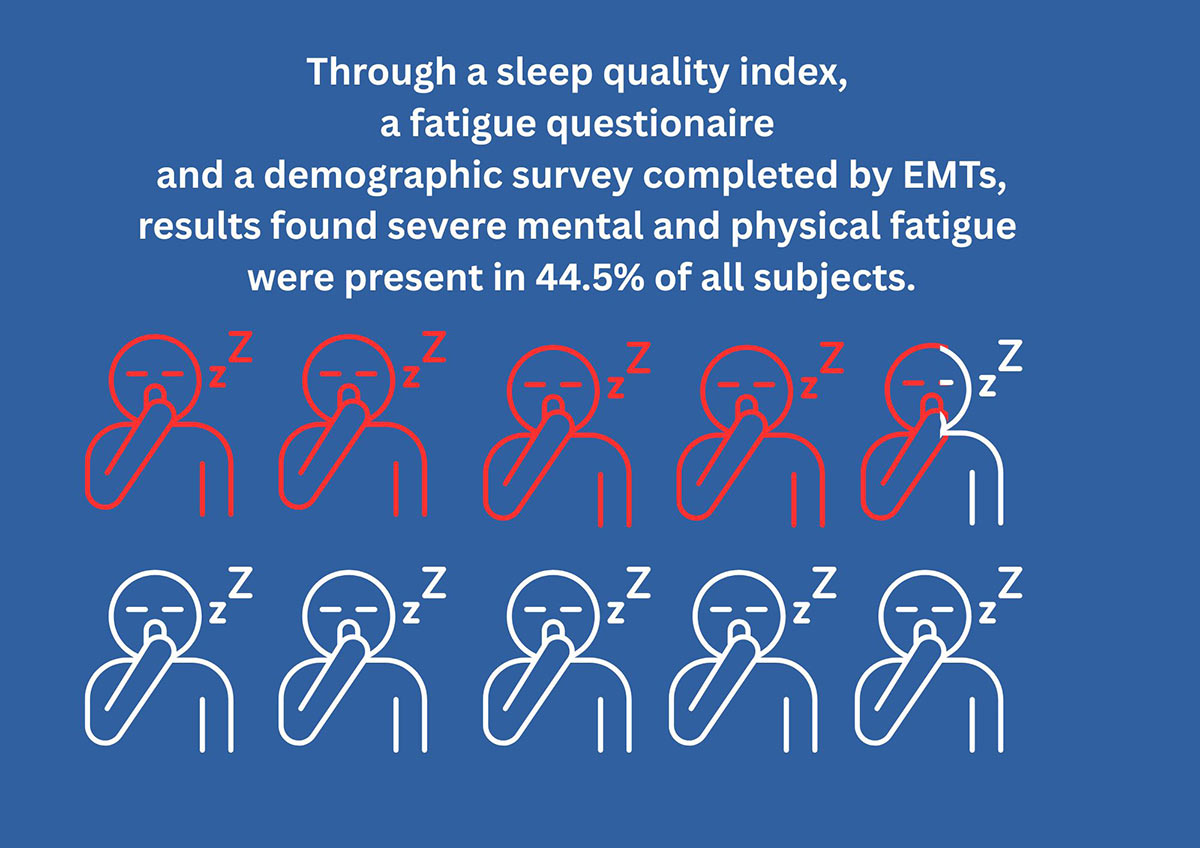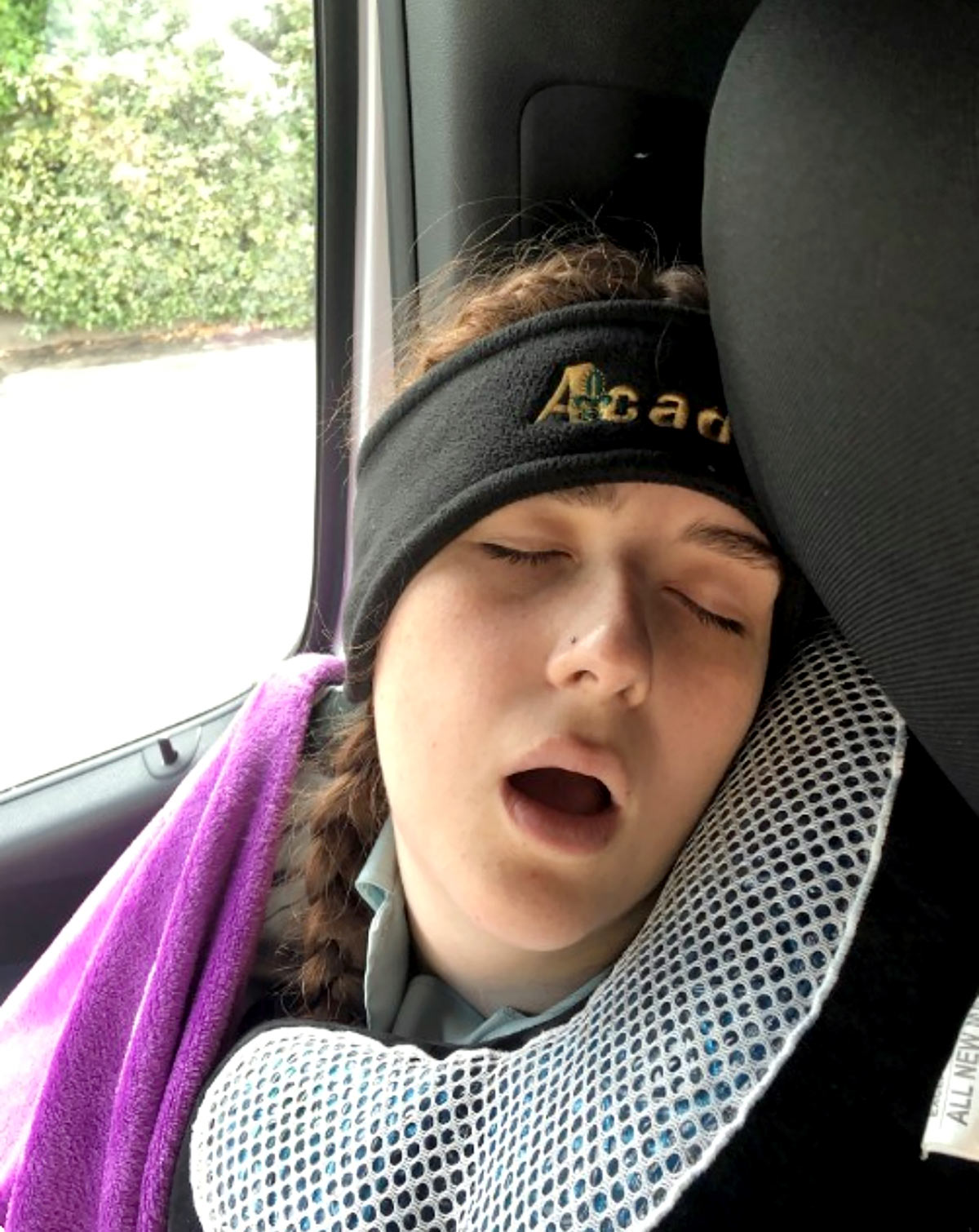
Story package by Maddie Sims and Meagan Lafley NRP
Sleep deprivation negative part of emergency services culture
CAREERS IN EMERGENCY MEDICAL services are uniquely demanding. EMTs and paramedics work long hours with unpredictable off times. They endure the stress of both administering lifesaving care and piloting large emergency vehicles at above-average speeds, often doing so while having been awake for 24 to 48 hours or longer.
The practice of working long shifts has become widely accepted as the standard for EMS providers. Many agencies seldom mandate rest periods or downtime.
The effects of chronic sleep deprivation directly inhibit EMTs’ ability to complete their life-saving duties. The chronically sleep-deprived struggle to pay attention, to make decisions and to think critically, and their overall vigilance is compromised.
There are two different classifications of sleep deprivation; total sleep deprivation, where an individual does not sleep at all for an extended period of time, and chronic partial sleep deprivation, where people sleep regularly, but get insufficient rest. Both types of sleep deprivation are commonly found among EMTs and paramedics.
Obligated to the call
Paramedic Michael Cummings has worked in the field for eight years and EMT Logan Butts has worked for three. Both said they preferred not to disclose where they work. They work long hours sometimes with little sleep.
On a typical day, Cummings and Butts respond to 911 calls and treat and transport patients. They also do facility transfers, which includes transferring bed-bound patients to facilities that can handle their level of care.
When Cummings first started, he was on a modified “DuPont” schedule for two years, working a 12-hour rotating shift pattern commonly used in 24/7 operations. “I flip flopped from nights to days in different rotations,” he said. “I did five nights on, six off, four days on, five off, three days on, two off, and a 24-hour day. It was a very bizarre schedule.”
Now, Cummings and Butts work a 6 a.m. to 6 p.m. seven day on, seven off schedule.
“But if someone calls 911, at 5:59 p.m., and we’re the closest unit to it, and our relief has not shown up to relieve us, then we have to,” Cummings said. “We’re obligated to run that 911 call. So now, our 12-hour shift has turned into a 13- or 14-hour shift, but that’s our truck.”
Butts said being sleep deprived has taken its toll.
“In the past, I’ve noticed myself getting more and more impatient, quicker to anger, the less sleep I get,” he said. “When you think about it, we work a 12-hour shift plus a 20-minute drive. We get off at 6 p.m., we probably leave at 6:15, so we’re home at 6:35 at best. You have stuff you need to do just in life, including making dinner, preparing the next day’s lunch, laundry, cleaning, just regular stuff. I like to work out, so then we wake up at 4:15 a.m. So, if we are not asleep by 8:15 p.m., we don’t get eight hours of sleep. That’s a best case scenario.”
Consequences of sleep deprivation
Research has found that total sleep deprivation hinders attention and working memory, as well as long-term memory formation and decision-making capacity.
Sound decision-making is paramount to providing adequate patient care, especially for EMTs and paramedics who often find themselves treating patients with the assistance of only one partner or alone. A provider that cannot make sound, quick decisions poses a great risk to medical outcomes of the patients that they treat.
Difficulty forming memories is also counterproductive to the completion of an EMT’s duties, which includes producing several pages of detailed charting every time a provider makes contact with a patient. It is common for a provider to be dispatched to several emergencies in rapid sequence, with little to no time between emergencies to keep notes, much less finish a patient care report.
An EMT who struggles to form memories will find it difficult to sit down at the end of a busy shift and accurately chart the care that they administered several hours, or sometimes even several shifts prior.
Cummings said by the seventh day of his and Butts rotation, they are “pretty darn tired.”
“That’s sort of the biggest problem with a 12-hour shift. It’s just hard to find time to do stuff without sacrificing sleep. The average person works eight hours a day, so we work a minimum of four hours more.
“Then the problem with night shifts, I found, is that life doesn’t really exist at night. The doctor’s appointments are during the day. If you want to go out with your friends or go out during the day, you don’t stay consistent with your sleep schedule.”
Both Cummings and Butts said they’ve become reliant on caffeine.
“I’ve never been the type that needed coffee or energy drinks until I got into EMS,” Butts said. “It’s gotten to the point where it’s a safety issue. Just the other day, I drove up and worked a shift in Lufkin. It’s a two-hour drive there, two-hour drive back. I had to drink a couple of energy drinks that day just to keep myself from driving off the road.”

Sleep deprivation vs. alcohol impairment
Chronic partial sleep deprivation diminishes one’s capacity to pay attention. An EMT who struggles to pay attention is a danger behind the wheel of an ambulance. Likewise, a paramedic who is struggling to focus has a diminished decision-making capacity and cannot be expected to efficiently and reliably make life-saving decisions.
The prevalence of EMS personnel suffering from chronic fatigue can also jeopardize the lives of anyone sharing the roadway. The dangers of driving while drunk are generally well understood by the public. Less known are the dangers of driving while fatigued, nor are the similarities between drunk driving and fatigued driving often recognized. In a clinical trial from 2000, subjects performed comparatively the same in tests of cognitive and motor performance while sleep deprived for between 17 and 19 hours as they did with a blood alcohol concentration of 0.05%.
Similarly, an article posted by the Sleep Foundation claimed that after 24 hours of sleep deprivation, an individual can expect to experience inhibition of reaction time, vigilance, multi-tasking, and hand-eye coordination that is equivalent to what they would experience with a blood alcohol content of 0.1%. To offer perspective on these figures, an individual caught driving with a BAC of 0.08% or higher would be considered to be driving under the influence in all 50 states.
The article also states experts estimate drowsy driving could be responsible for as many as 6,000 fatalities in the United States every year. That presumes normal driving conditions.
Those piloting ambulances, however, are often moving at 10 to 20 miles per hour above the posted speed limits. This practice presents an increased risk of injury or death to all ambulance occupants, even in the absence of a sleep-deprived driver.
“We’re lucky our company has a bunch of safeguards in place,” Butts said. “The average person gets pretty tired after hours 11 and 12, but there’s some companies that have 24 or 48-hour shifts and you’re driving the entire time. Our company has at least realized that’s a safety issue, and they won’t let us work more than 12 to 18-hours on a 12-hour truck. Plus, we’re allowed to call downtime, no questions asked.”
Butts said every ambulance has advanced cameras which can detect when a driver is starting to feel fatigued, and will notify them to take a break.
“It’s dinged at me a few times because it’s recognized that I’m tired,” Butts said. “Oddly enough, it’s never towards the end of my shift, I’m actually more lively at the end. It’s at the very beginning where I’m yawning and trying to get awake. That’s a little safeguard they’ve put in place for us.
“And if for some reason, you’re too tired to go out of town, you can always express that. We’ll pull over and call down-time, go to the nearest station — or swapping drivers is pretty common, especially on the way back. Our company’s been very good about that.”
Effects on mental and physical health
Insisting providers continue to treat patients once they are beyond the point of exhaustion does little more than set them up for failure. For EMTs and paramedics, whose high-stress occupation already predisposes them to below-average mental health, the consequences can be even greater.
Research shows chronic shift work correlates heavily with diminished general mental and physiological health in prehospital. In a 2010 academic journal, researchers studied EMS providers who completed a sleep quality index, a fatigue questionnaire, and a demographic survey. Results from both the sleep quality index and the fatigue questionnaire indicated that severe mental and physical fatigue was present in 44.5% of all subjects. The results from the demographic survey found that a majority of subjects were overweight or obese, and 59.6% had been diagnosed with one or more health conditions.
The Division of Sleep Medicine at Harvard Medical School found that sleeping fewer than eight hours a night on a regular basis can increase an individual’s likelihood of developing medical conditions such as obesity, diabetes, cardiovascular disease, hypertension, compromised immune function, and an increased instance of developing symptoms of the common cold.
Excessive shift work results in fatigue and lessened overall physical and mental wellness for EMS providers.
Adopting a cultural norm
A widely held belief among EMS providers is that shifts lasting 24 consecutive hours or longer, consistent, excessive overtime, and chronic sleeplessness are integral to the condition of being or becoming an EMT or paramedic.
“When it comes to being in the medical field, workers have to get used to, be okay with, and consistent with the limiting amount of sleep,” Cummings said.
The cultural mindset is that if a person is not “tough enough” to endure chronic sleep deprivation, then they must also be unfit for the other physical and psychological challenges of the job. The condition of being tired and overworked has become suffused throughout the culture — which is to say, to be an EMT or a paramedic is to be utterly and ceaselessly exhausted. This culture puts newcomers under pressure to agree to extremely long hours. Tolerating sleeplessness has become so commonplace that it could result in a negative rite of initiation, where new employees are purposely expected to stay awake for extended periods or risk being rejected or passed over by employers in favor of those with a higher tolerance for exhaustion.
One may even fear being ostracized by coworkers and regarded as an undesirable partner, as coworkers may fear finding themselves on the scene of an extreme emergency with a partner who is too inhibited by tiredness to properly provide assistance.
This incentivizes newcomers to conceal or be dishonest about their levels of fatigue to avoid appearing weak or unfit for duty.
Sleep deprivation in American culture
The idea that “sleeping is a vice, but sleep deprivation is a virtue” is not exclusive to the culture surrounding EMS; more broadly, it is rooted deeply in American culture.
In the book “Dangerously Sleepy,” author Alan Derickson writes about the shift in perception, especially among blue-collar shift workers, from the 19th century to the present, that a hard-working man is one who works long hours with little rest. Being chronically overworked and, as a result, chronically sleep deprived, has become synonymous with being motivated and generally successful.
This praise of chronic exhaustion resulted in the demonization of prioritizing the biological need for rest. The belief that tiredness is integral to one’s identity as an EMT or even just a hard-working provider, coupled with the belief that seeking adequate levels of rest labels one as lazy and unmotivated, is a dangerous combination.
Long-time EMTs and paramedics have found an environmental niche and have built their lives around long hours. Fear of competition or apprehension of change, may cause EMS providers to push back against attempts to regulate shift length or impose limits on overtime hours.
Plagued by a mindset of, “This is how we have always done things,” EMS workers have largely internalized this exhaustion culture.

EMT-paramedic Meagan Lafley was photographed by her coworker in the ambulance during a long shift.
A need to adapt
Culturally, what is needed is not simply a change of practice, but also a change of ideas, perceptions and culture. This change cannot happen until an honest evaluation of data surrounding sleep deprivation and its consequences is embraced.
The United States has experienced a crisis of staffing of EMTs and paramedics in the past few years because of the working conditions and high demands of the job.
Awareness and self-care
Cummings said he and Butts strive to take care of their mental health as much as possible.
“Logan and I are both, I feel, pretty good at that,” Cummings said. “We travel relatively often on our seven days off.”
Butts said he spends a lot of time outdoors and has a therapist to deal with the mental stress that accompanies the job.
“There have been times when we’ve experienced some awful, traumatic things that’s kept me up, and that’s caused some sleeping issues,” Butts said. “I just didn’t sleep as much because my brain was just going off about the things we’ve seen. That’s something that we’ve had to learn to cope with.
“A big cause of it is just, ‘How could I have done this all better? Could I possibly have saved this person’s life?’ And luckily, with Michael and I, we know that our skills are where they need to be to where if that patient had a chance to make it, it was with us.”
Butts said people who have worked in the field longer develop coping mechanisms.
“I’ve only been in it three years,” Butts said. “It takes a while to see almost everything. Michael has seen it all. I will say, though, that even just after my three years, I’m doing much better.”
One way of coping is to dehumanize the patient, Butts said, almost looking at them as machines to be fixed, although it is hard when they could not save a patient.
“(It) separates the emotion from it,” he said. “If I can separate the emotions on the call, it prevents me from getting tunnel vision and letting the emotions take hold and prevent me from doing my job. That kind of disconnect has to be there for mental health’s sake.”
Despite the difficulties of sleep deprivation and trauma, Cummings and Butts said they love their jobs. Cummings said the second he stops enjoying it, he will stop.
“It’s not a job you do for the money,” he said.
Butts said he always wanted to work in the medical field and being an EMT gives him a more direct connection with his community.
“You are going into these people’s homes, and we even work in the town I grew up in,” he said. “I’ve driven past these houses my whole life, and now I’m going into them, seeing what it’s like inside, seeing what these people’s lives are like, and helping them.”
Emergency medical service workers perform a vital role in the community. It is a hard and often thankless role. Recognition of their working conditions is integral to continued quality of service and well-being of the workers so we can all benefit from their work.
